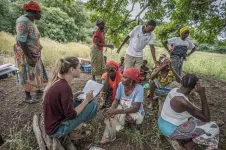(Press-News.org) CAMBRIDGE, MA -- Thousands of different bacterial species live within the human gut. Most are beneficial, while others can be harmful. A new study from an MIT-led team has revealed that these bacterial populations can remake themselves within the lifetime of their host, by passing genes back and forth.
The researchers also showed that this kind of gene transfer occurs more frequently in the microbiomes of people living in industrialized societies, possibly in response to their specific diets and lifestyles.
"One unexpected consequence of humans living in cities may be that we've created conditions that are very conducive to the bacteria that inhabit our guts exchanging genes with each other," says Eric Alm, director of MIT's Center for Microbiome Informatics and Therapeutics, a professor of biological engineering and of civil and environmental engineering at MIT, a member of the Broad Institute of MIT and Harvard, and the senior author of the new study.
The study is the first major paper from the Global Microbiome Conservancy (GMbC), a consortium that is collecting microbiome samples from underrepresented human populations around the world in an effort to preserve bacterial species that are at risk of being lost as humanity becomes more exposed to industrialized diets and lifestyles globally.
"Most of the species that we find in rural and isolated populations are species that you wouldn't see in the industrialized world," says Mathieu Groussin, an MIT research associate and one of the lead authors of the paper. "The composition of the microbiome shifts completely, and along with this, the number of different species is diminishing. This lower diversity of the industrialized microbiome might be a reflection of poor intestinal health."
MIT research associate Mathilde Poyet is also a lead author of the study, which appears today in Cell. Other authors of the paper include researchers from institutions in Denmark, France, South Africa, Cameroon, Canada, Finland, New Zealand, Tanzania, Spain, Sweden, Ghana, and Nigeria.
Microbe diversity
The GMbC launched in 2016, with the mission of preserving human microbiome diversity before it is lost. So far, the project has gathered samples from 34 human populations worldwide. The GMbC consortium includes scientists from each country where samples are being collected.
"This effort is being led by MIT, but it is really a global collaboration," Poyet says. "With our international consortium, we're putting time and effort into collecting and preserving the individual bacterial strains so that we can keep them indefinitely into future generations, but all of those bacteria and their derivatives are still owned by the participants who provide them."
Previous work has shown that the composition of the microbiome in people living in industrialized societies is very different from that of rural peoples living in relative isolation. Nonindustrialized populations usually have a larger bacterial biodiversity, including many species that are not seen in industrialized populations. Differences in diet, antibiotic use, and exposure to soil bacteria are hypothesized to contribute to these differences.
In the Cell study, the researchers explored the phenomenon of horizontal gene transfer, which occurs when bacteria living in the same environment pass genes among each other. In 2011, Alm's lab discovered that the human gut is a hotspot for this type of gene exchange. However, with the technique the researchers were using at the time, they were only able to determine that these gene transfers had likely happened sometime within the past 5,000 years.
In their new study, the researchers were able to estimate much more precisely when these transfers occurred. To do this, they compared the genetic differences between different species of gut bacteria. When they compared pairs of bacterial species that came from the same person, they found a much higher rate of genetic similarity than that seen in the same pairs taken from two different people, confirming that horizontal gene transfer can happen within the lifetime of an individual person.
"One of the really exciting things about this paper is we were finally able to answer the question of whether the rate of horizontal transfer has been high in the human microbiome over the last few millennia, or is it true that within each person's lifetime, the bugs in their gut are constantly trading genes back and forth with each other," Alm says.
Exchanging traits
Depending on the species, the researchers found that bacteria might obtain between 10 and 100 new genes every year. The researchers also found that the rate of gene exchange was significantly higher in people living in industrialized societies, and they also saw differences in the types of genes that were most commonly exchanged.
As one example, they found that among pastoralist populations who treat their livestock with antibiotics, genes for antibiotic resistance are among those exchanged at the highest rates. They also found that people from nonindustrialized societies, especially hunter-gatherers, had high rates of gene exchange for genes that are involved in fiber degradation. This makes sense because those populations usually consume much more dietary fiber than industrialized populations, the researchers say.
Among the microbes found in industrialized populations, the researchers found especially high rates of exchange for genes whose role is to facilitate gene transfer. These microbes also have higher exchange rates for genes involved in virulence. The researchers are now investigating how those genes may influence inflammatory diseases such as irritable bowel syndrome, which is seen much more often in industrialized societies than nonindustrialized societies.
INFORMATION:
The research was funded by the Center for Microbiome Informatics and Therapeutics at MIT, the Rasmussen Family Foundation, and a BroadNext10 award from the Broad Institute.
For middle-aged women, exercise has many health benefits, but it may not help maintain cognitive function over the long term, according to a new UCLA Health study. The study observed a diverse group of roughly 1,700 women over a 21-year period starting when the women's average age was 45. In the study, women's cognitive ability was tested in three key areas: cognitive processing speed (how fast the mind works); verbal memory (the ability to recall a story that they heard); and working memory (the ability to manipulate information).
The study was published in JAMA Network Open, and is one of the first ...
LA JOLLA, CA--What's the difference between a giggle and a belly laugh? Or a yelp and an all-out scream? In many species, including humans, the volume and duration of a verbal sound conveys as much information as the noise itself.
A group of scientists, led by Scripps Research, has discovered a node in the brains of male mice that modulates the sounds they make in social situations. This discovery, published in Nature, could help identify similar locations in the human brain, and potentially lead to a better understanding of social disorders such as autism or depression.
"Identifying this node gives us signatures of what to look for when human behavior goes awry," says Lisa Stowers, PhD, a neuroscientist and professor at Scripps Research who led the study. ...
Harvard University researchers have identified the biological mechanism of how chronic stress impairs hair follicle stem cells, confirming long-standing observations that stress might lead to hair loss.
In a mouse study published in the journal Nature, the researchers found that a major stress hormone causes hair follicle stem cells to stay in an extended resting phase, without regenerating the hair follicle and hair. The researchers identified the specific cell type and molecule responsible for relaying the stress signal to the stem cells, and showed that this pathway can be potentially targeted to restore hair growth.
"My lab is interested in understanding how stress affects ...
Swansea University physicists, as leading members of the ALPHA collaboration at CERN, have demonstrated laser cooling of antihydrogen atoms for the first time. The groundbreaking achievement produces colder antimatter than ever before and enables an entirely new class of experiments, helping scientists learn more about antimatter in future.
In a paper published today in Nature, the collaboration reports that the temperature of antihydrogen atoms trapped inside a magnetic bottle is reduced when the atoms scatter light from an ultraviolet laser beam, slowing the atoms down and reducing the space they occupy in the bottle -- both vital aspects of future more detailed ...
Scientists have developed vaccines for COVID-19 with record speed. The first two vaccines widely distributed in the U.S. are mRNA-based and require ultracold storage (-70 C for one and -20 C for the other). Now, researchers reporting in ACS Omega have developed a tamper-proof temperature indicator that can alert health care workers when a vial of vaccine reaches an unsafe temperature for a certain period, which could help ensure distribution of effective mRNA vaccines.
The two COVID mRNA vaccines contain instructions for building harmless pieces of the SARS-CoV-2 spike protein. Once the vaccine is injected into the body, human cells use the mRNA instructions to make the spike protein, which they temporarily ...
Increased consumption of flavanols - a group of molecules occurring naturally in fruit and vegetables - could protect people from mental stress-induced cardiovascular events such as stroke, heart disease and thrombosis, according to new research.
Researchers have discovered that blood vessels were able to function better during mental stress when people were given a cocoa drink containing high levels of flavanols than when drinking a non-flavanol enriched drink.
A thin membrane of cells lining the heart and blood vessels, when functioning efficiently the endothelium helps ...
LAWRENCE -- New research from the University of Kansas END ...
Meat and fish fraud are global problems, costing consumers billions of dollars every year. On top of that, mislabeling products can cause problems for people with allergies, religious or cultural restrictions. Current methods to detect this fraud, while accurate, are slower than inspectors would like. Now, researchers reporting in ACS' Journal of Agricultural and Food Chemistry have optimized their handheld MasSpec Pen to identify common types of meat and fish within 15 seconds.
News stories of food fraud, such as beef being replaced with horse ...
SAN ANTONIO (March 31, 2021) -- Insomnia and obstructive sleep apnea have increased dramatically among active-duty military members over a 14-year period, 2005 through 2019.
Insomnia increased 45-fold and sleep apnea went up more than 30-fold, according to a study led by The University of Texas Health Science Center at San Antonio (UT Health San Antonio).
The study found that the most likely military member to be diagnosed with either sleep disorder was married, male, white, a higher-ranking enlisted Army service member and age 40 or older.
The researchers compared medical codes that represent diagnosis of sleep apnea or insomnia in active-duty Army, Navy, Marine Corps and Air Force personnel. No medical ...
Risks of SARS-CoV-2 coronavirus infection for long-stay nursing home residents were mainly dependent on factors in their nursing homes and surrounding communities, according to a large study led by a researcher at the Johns Hopkins Bloomberg School of Public Health.
By contrast, the study found that the risks of being hospitalized with, and of dying from, COVID-19, depended more on patient-specific characteristics such as age and body mass index--although the mix of factors linked to hospitalization was distinct from the mix of factors linked to mortality.
The study, which appears online March 31 in JAMA Network Open, detailed COVID-19 risk factors among more than 480,000 long-stay nursing home residents in the ...




